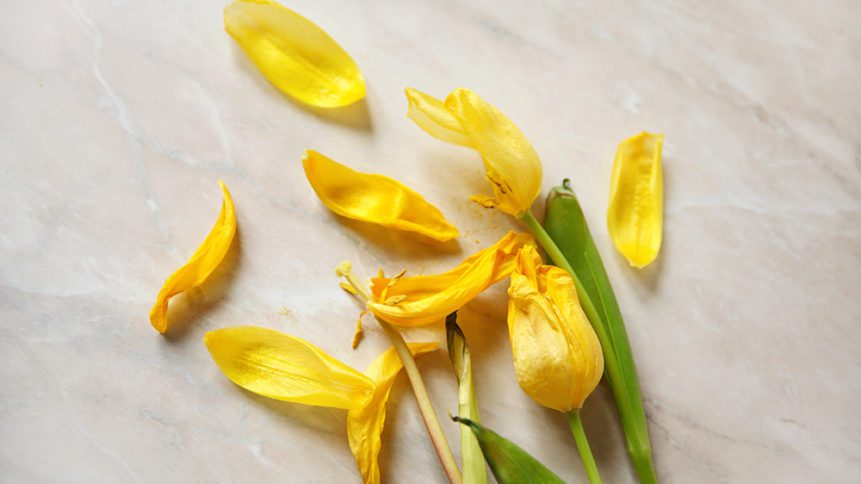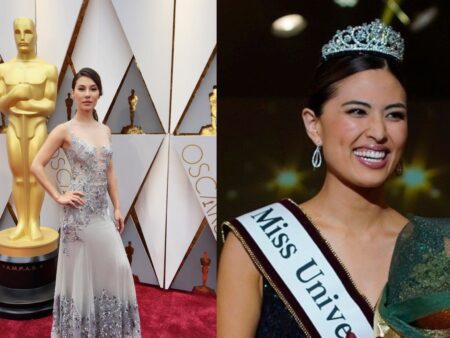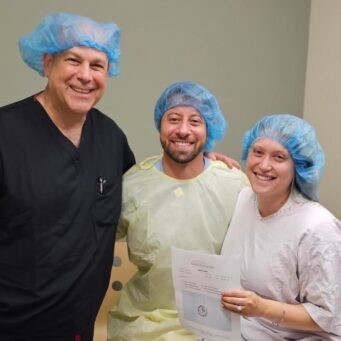
“Mike,” I texted. “All of the tulips are dead. This is terrible.”
Five minutes passed with no reply. I sat at the kitchen table and stared at the sad state of the tulips, the stems hanging over the side of the vase, the white petals scattered, the yellow pollen in small dust piles. I placed the vase in the center of the table and took a photo from three different angles.
“We bought them two days ago,” I wrote below the photos that I included in the next text message. “From a FLORIST. These aren’t grocery store flowers. This is a VERY bad sign. It didn’t work.” It was the embryo transfer, our seventh, which was five days prior; we had to wait five more days until the pregnancy test. I dropped my head onto the table, and it made a loud thunk.
“Hey,” he texted back ten minutes later. “Sorry. Was in meeting. Calm down. They r just flowers. Stop.”
“YOU STOP.”
“Holly, you’re being silly.”
“The tulips are dead. I have a vase full of tulips that look like LIMP PENISES! This is a sign. I kill everything that is alive. If it worked, I would feel it by now.”
He wrote: “ENOUGH. I’ve done nothing but balance out your negative energy all week. You said this cycle would be different.”
The silence of the kitchen was deafening, but there was a cacophony inside my head. My mind couldn’t keep up with my fingers; my fingers couldn’t keep up with my mind. I just couldn’t keep up.
“You think I’m not trying?!?!? You don’t get it. I hate you.”
I broke into a sweat. I felt myself floating above my body and laughing. You hormonal lunatic! You bitch! This behavior is not okay! But I couldn’t control the rage or the tears or the speed of my fingers against my virtual keyboard.
What was IVF doing to me? To my marriage? Could a baby, if we were lucky enough to have one, somehow justify all this misery?“And fine!” I continued. “Don’t come home. I don’t care. I never want to see you again it doesn’t matter nothing matters it’s over it’s all over so whatever I can’t even believe this is happening I don’t even know what to do they are dead I’m sorry I’ll stop I promise I’ll stop—.”
I slammed my chair into the corner and stormed out of the kitchen, drenched in a rage-fueled sweat. I refused to look at the vase of flaccid tulips as I left.
I practically stomped to the bathroom, stripped off my sweaty clothes, and turned on the shower as hot as my skin could tolerate, sobbing. What was IVF doing to me? To my marriage? Could a baby, if we were lucky enough to have one, somehow justify all this misery?
The desire for a baby was something that felt cellular, a part of me that went beyond explanation or understanding. To have a child felt essential and intuitive. It wasn’t about ego. It wasn’t about expectations. It wasn’t “about” anything. It was that I felt incomplete, my life felt incomplete, my marriage felt incomplete, without a child.
Even as a child, I was fascinated by pregnancy and motherhood. Soon after my mother’s pregnancy with my sister, during which I stuffed a pillow under my shirt to create a baby bump, my mom received a phone call from my daycare. They were disturbed that I had taken off my shirt to breast-feed my baby dolls, pinching my three-year-old nipples as hard as I could to make sure my “baby” was latching on. When my brother was born I was nine years old. I felt too old to play with dolls and eager to help my mom in real ways, like changing his diapers and rocking him to sleep.
Although as a woman, I griped about my body’s imperfections, the way women do, I also (secretly) believed that these same features—large breasts, a gently cushioned stomach—would assure me my desired maternity. I had a womanly figure. I oozed maternal goodness, yet… I couldn’t seem to maintain a pregnancy.
I had a womanly figure. I oozed maternal goodness…yet, I couldn’t seem to maintain a pregnancy. Half an hour later, after I’d showered and regained some sense of composure, Mike arrived home. I pretended not to hear him. I was still in a towel, and I turned on the bathroom sink. He was earlier than I had expected. I hadn’t been sure he would come home at all.
“Hey,” I heard him shout above the faucet. “I’m home!”
I didn’t have the energy to respond.
“Hey,” he said again, and I closed the bathroom door as I heard his footsteps approach.
“Listen,” he said outside the door, “I really don’t want to deal with this tonight.”
He didn’t want to deal with this? I cracked the door open. His face was defeated and tired, his eyes muted and his skin ashy, though his cheeks were still red from his walk home in the deep February freeze. He held a bouquet of roses and Gerber daisies—no tulips—wrapped in the same brightly colored tissue paper that the tulips were wrapped in thirty-six hours prior. You bought me flowers from the same florist where the tulips came from? I wanted to ask. What is wrong with you? Then quickly my face flushed with humiliation.
I opened the door. He held the bouquet toward me.
“Please no talk of flowers, okay?” he pleaded.
“I’m sorry,” I said. “Sometimes I just totally lose control. These hormones…”
“It’s okay,” he said quietly. He walked toward me, kissed my forehead, and placed the flowers in my arms.
That cold night, I cradled the bouquet like a baby, hoping it was a good omen.
The flowers remained in bloom until after the pregnancy test, but when the call came it was that our cycle had in fact failed, that I was not pregnant.
It would take two more years of hormonal swings and the many frustrations that plagued our process—but eventually, instead of flowers, I cradled our long-awaited daughter in my arms.
Faith and love and perseverance trump any bad omens.
Contributor
Holly Schechter
Holly Schechter is an English teacher at Stuyvesant High School in New York City. She also serves on the editorial staff of Intima: Journal of Narrative Medicine.

Listen to stories, share your own, and get feedback from the community.

















